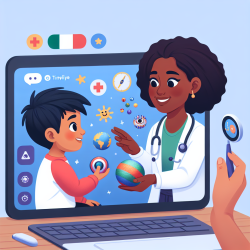The COVID-19 pandemic has fundamentally altered the landscape of mental health care, accelerating the adoption of online psychological interventions. A recent study titled Synthesizing Stakeholders Perspectives on Online Psychological Interventions to Improve the Mental Health of the Italian Population during the COVID-19 Pandemic: An Online Survey Study offers valuable insights that can help practitioners enhance their skills and improve outcomes for children receiving online therapy services.
This research, conducted by Bertuzzi et al. (2022), surveyed 1024 Italians to understand their experiences, needs, and attitudes towards online psychological interventions during the pandemic. Key findings reveal both advantages and barriers to the adoption of online therapy, providing a data-driven foundation for improving service delivery.
Key Findings and Practical Applications
Understanding the perspectives of stakeholders is crucial for developing effective online therapy programs. Here are some actionable insights from the study:
- Reduction in Geographical Barriers: Online therapy can significantly reduce geographical barriers, making it accessible to children in remote areas. Practitioners should focus on creating user-friendly platforms that can be easily navigated by both children and their caregivers.
- Economic Benefits: Online interventions can be more cost-effective than traditional face-to-face sessions. Schools and therapy providers can leverage this advantage to offer more affordable services without compromising quality.
- Technological Challenges: The study highlights that technological issues are a significant barrier. Ensuring that both therapists and clients have reliable internet access and are comfortable using digital tools is essential. Providing training sessions for caregivers and children can mitigate these challenges.
- Privacy Concerns: Privacy and safety are major concerns for stakeholders. Using secure, HIPAA-compliant platforms and educating families about data security can help build trust and encourage the use of online therapy.
- Engagement and Motivation: Low motivation was identified as a barrier. Interactive and engaging therapy sessions that incorporate gamification and multimedia can help maintain children's interest and participation.
Encouraging Further Research
The study also underscores the need for ongoing research to continually refine and improve online therapy interventions. Practitioners are encouraged to participate in or initiate research projects that explore innovative approaches to online therapy, particularly for children. Collaborating with academic institutions can provide access to resources and expertise that can enhance the quality of research.
Additionally, gathering feedback from children and their families can offer valuable insights into their needs and preferences, helping to tailor interventions more effectively.
Conclusion
Incorporating the findings from the study by Bertuzzi et al. (2022) into practice can help speech-language pathologists and other mental health professionals improve the efficacy and accessibility of online therapy for children. By addressing the identified barriers and leveraging the advantages, practitioners can create more engaging, effective, and accessible online therapy programs.
To read the original research paper, please follow this link: Synthesizing Stakeholders Perspectives on Online Psychological Interventions to Improve the Mental Health of the Italian Population during the COVID-19 Pandemic: An Online Survey Study.










